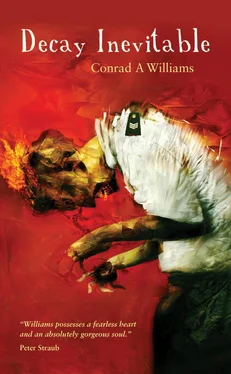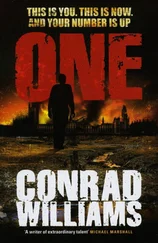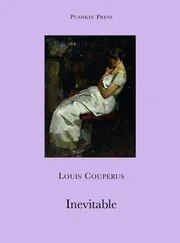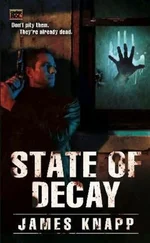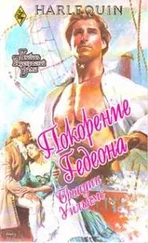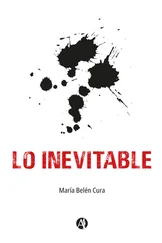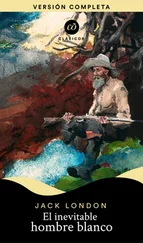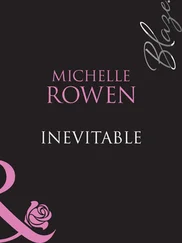There was a knock at the door.
Will stood up. He didn’t want to look to his side. Someone lay there, unmoving. A body, losing heat. But that couldn’t be right. This was a house of warmth and promise. He went to the window and peeked through the curtains. There were people outside.
Sally, there’s someone watching us… Would you mind opening the front door, please, sir?
The voice came to him heavy and full of interference, as though he were a child again, listening to a message from a friend through a Ski yoghurt pot at the end of a piece of string. He went to the door and opened it on a tired policeman in a wet uniform. For a moment he didn’t recognise the man for his scrubbed look and the extra few pounds he was carrying on his jowls and his waistline. But in the moment he recognised him, he recognised too how he had been tricked. Death didn’t work to a timetable. He remembered how de Fleche had put that. Death was sinuous and sly. Death was a Moebius strip, or Ouroboros, the serpent that eats its own tail. This was Sean’s beginning, and Will’s true end.
Sorry to bother you, sir. We’ve had word of a prowler in the area. Have you seen anything? Heard anything?
De Fleche spoke through him as he was about to give the architect to Sean, making a mockery of any belief Will had that he was in control.
I was asleep. Your torches woke me up.
Sean seemed satisfied with that. Will raged against the seal that de Fleche had squeezed between him and the outside . Is there anyone else in the flat that might have heard anything?
Luce, my girlfriend, she’s asleep too. You’d have had to drive your car through the wall to wake her up.
And then the policeman was apologising and backing off, hurrying back through the rain with his partner to a car that was warm.
When they were alone again, de Fleche let the leash out a little and Will struggled against it, battling to be free. The book was just pages and glue but it had more spine than he. It was yesterday’s book. Catriona didn’t exist any more, the book meant nothing.
“I don’t want to be in your pocket,” he said, sounding like a petulant child at a birthday party who had failed at every game.
“Too late,” de Fleche said. “You killed her. How does that make you feel? You and women are a potent combination, aren’t you? Lethal. How many’s that now? You should have some stickers done, slap them on the side of your cockpit. Authorised kills. Will, the Red Baron. The Strangler. Sleep-Stealer. Kids’ll have trouble going to bed knowing you’re on the hoof.”
“You killed her,” Will said.
“Oh go on, don’t be so modest. You passed my test, squadron leader. Ladykiller. You’re in the army now. Go out there and make mayhem. Make lots of what you are. It’s New Year’s Day for you, for all of us. Year Dot. Year Zero. Let’s have a fresh start.”
The door opened and he found himself in another street in a part of the world he didn’t know. There were others there like him, thin men with clothes that hung on their bodies in dire need of a wash. They sweated, these men, and he sweated too, despite the cold. One of them came up to him, scratching the back of his head and looking around him maniacally as if they were in the middle of a column of biting gnats. His hair was a greasy cap stuck to his scalp and his chin had not felt a blade for a week or so. He wouldn’t look at Will, and when he parted his lips to talk, a fist-sized glut of flying beetles buzzed out of his mouth. He didn’t notice them. They might as well have been exhaled smoke; he certainly looked nervous enough to need a cigarette.
“Are you hungry?” the man said. “I’m hungry. Are you hungry? Because, like, I am hungry. Am I hungry? Too right. Too right. How about you? You hungry?”
The other thin men were looking at him with similarly earnest expressions. There was trouble too, in their eyes, as if they couldn’t quite understand how they had come to be in this position. They looked at Will, the newcomer, as if he had brought some instructions with him.
Up ahead, behind a blockade of cars, he could see more people, but these were not like him or the other thin men. They were stouter and wore a better cut of clothes. They were nervous. Some of them held guns or knives. Their children stood behind them, guarded by the legs of their elders. Even at this distance, Will could smell their odious flesh and the alcohol reek of their perfumes and soaps. They smelled of fat and dairy products. They smelled of mouthwash and shoe polish. It made Will’s mouth sour to feel such an alien flavour in his throat. The thin men walked slowly towards the blockade, and all they could think about was how they wanted to make those fat people less glossy, less stench-ridden. Thinner.
GLEAVE WAS DEAD. But it wasn’t his leg injury that had killed him. Appalled, Sean took in the extent of his degeneration. He resembled potatoes that had been left to boil for too long and had collapsed to a watery vichyssoise in the pan. Tufts of hair or nubs of bone emerged – macabre islands – laced with bloody veins, like seams of sauce in raspberry ripple ice cream. His suit had become a poor-quality bag in which to contain him. Sean couldn’t feel satisfied with Gleave’s death. It had not been achieved by his own hand. He felt cheated, ill-organised. Things were passing him by.
The gun in Sean’s hand drew him on. Without it, he might have stayed with Emma until someone forced him to leave her. The ticks from the cooling engine of the lorry were more spaced out now. Water dribbled from the cracked radiator and a sigh eased from its innards, as if the machine were settling into its death.
He remembered little of what Pardoe had said of Cheke, but he remembered what he had said about her improvement. She had already been dangerous, and very fast, that day when Marshall had been killed. How long ago was that? A few weeks? Sean found it hard to nail down time now. So much had happened. His life had seen the kind of upheaval that a man of eighty would never witness. Time became unimportant in those shadows. All it did was tease you with how much more shit you might have to put up with.
The gun felt comfortable in his hand. He edged outside, past the creaking back end of the lorry and the rotting brick teeth at the smashed entrance. Small fires had combusted here, despite the cold and damp. They burned sootily and pumped oilsmoke across fields that were white with frost. Bare branches made stark exclamation marks on their perimeters. The sky was a beautiful blue, paling as it bent to touch the horizon. There were a few icy scratches up there but no clouds. A bird sang a brief, exhilarating snatch of song from the chimney stack. The taxi was parked to the side of the farmhouse, the door open, the keys still in the fascia.
He watched Vernon Lord staggering across the field, pursued, if such leisurely advancement could be described so grandly, by Cheke. The crash had realigned her somewhat: she was dragging her leg behind her and the leg, freed from any immediate control, was finding it hard to concentrate on remaining a leg. From here, it looked like a head, with a baseball cap jammed down over the ears.
There was nothing he could do. He watched until, like a leopard bringing down a deer, Cheke had Vernon underneath her. He screamed, or tried to scream, for as long as it took her to detach his face. Then Vernon withdrew into himself like a surly child. Age piled on to him, denuding his bones, puckering his flesh into a sea of wrinkles and liver spots. Cheke stepped back, aghast. He’d had enough, old Vernon. All the fight was gone from him and time, waiting in the wings, had recognised its cue. It came back to him, with interest, enjoying the feel of meat that it had been cheated of for so long. It wasn’t Cheke that killed Vernon Lord; it was his own greed that did it.
Читать дальше
